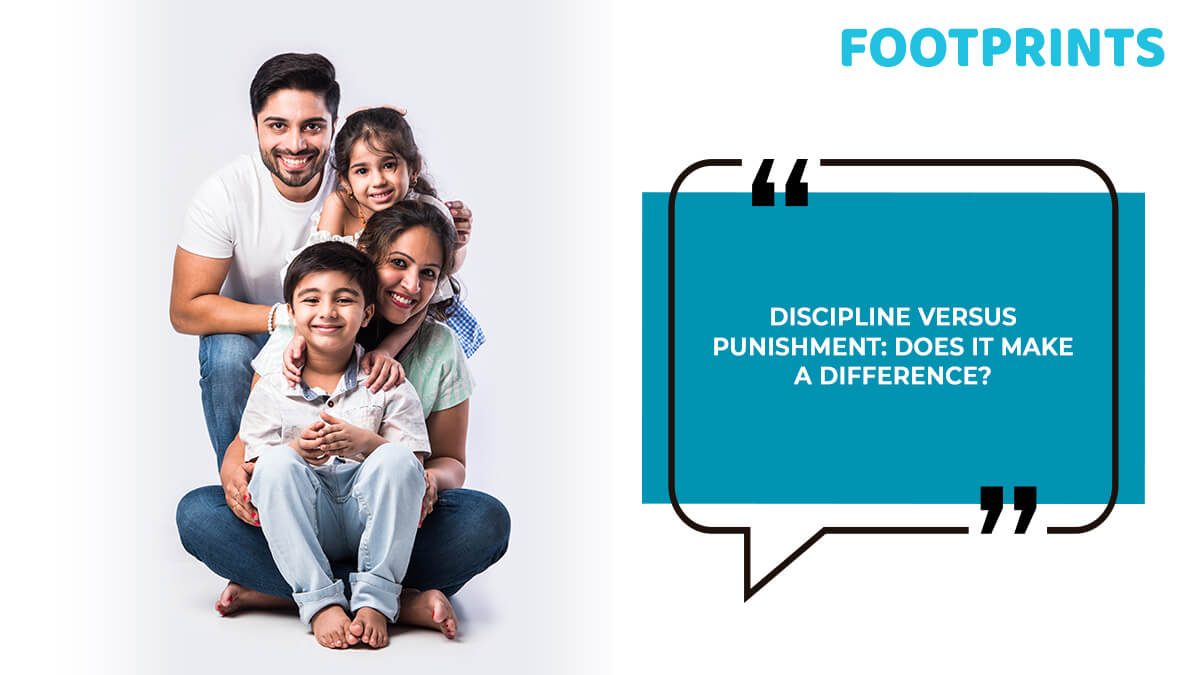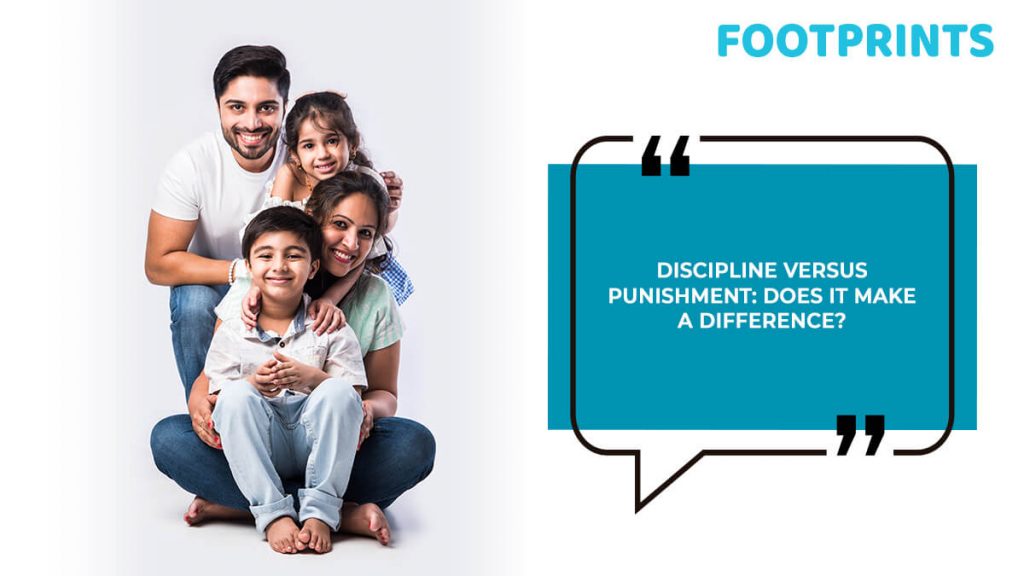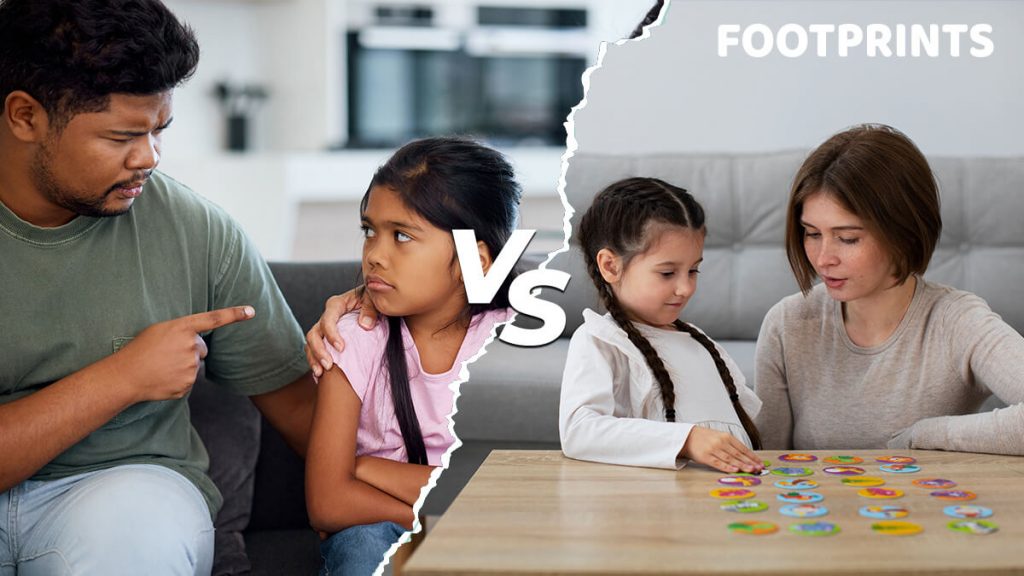

As parents, we often find ourselves longing for a parenting manual, particularly in the present era when children are exposed to so much. Undoubtedly, parenting has evolved into a formidable undertaking. While we intend to instil discipline in our children, it’s a reality that many of us tend to use the terms ‘discipline’ and ‘punishment’ interchangeably.
Is there a difference between the two? What is it? These are some essential areas that we need to explore.
At Footprints Play School, a play school that has emerged as a preferred parenting partner, we believe that the simple answer to the difference between discipline and punishment is that while discipline focuses on ensuring that the child makes a better choice next time, punishment works around making the child pay the price for a past mistake. Let us delve deeper into both concepts and study their impact:
Discipline
‘discipline’ originates from the Latin word ‘disciplina,’ which means ‘instruction.’ It, in turn, derives from the root word ‘discere,’ signifying ‘to learn.’ As discussed earlier, the objective of healthy discipline is to empower children to make better decisions in the future. Healthy discipline, therefore, involves several essential steps. The first step is to establish reasonable limits and rules. Ideally, these rules should be discussed with the child, and the child’s agreement should be sought, considering the child’s age. Equally important is the need to explain the consequences if the rules are violated to the child. These consequences could include time-outs or even the removal of certain privileges. The consequences should be reasonable, age-appropriate, and time-sensitive.
It’s important to remember that discipline is a proactive mechanism, not merely a reactive response to an action. Although we often associate discipline with a negative connotation, it involves reinforcement. Therefore, discipline techniques also encompass various positive approaches, such as praise and rewards. This positive reinforcement incentivizes the child to adhere to the established rules.
The numerous benefits of discipline include:
- Discipline isn’t about shaming children for poorly performed tasks. Since it doesn’t shame children, it also doesn’t negatively impact their confidence, ensuring they don’t continue to make poor choices.
- It helps children learn from their mistakes.
- It strengthens the relationship between parents and children.
- It also helps children acquire various new skills, such as managing their behaviour and dealing with a range of emotions.

Punishment
After examining the purpose and execution of discipline, let’s delve into what punishment entails. In simple terms, punishment is a penalty for a child’s mistakes or offenses. A parent may raise their voice at the child or even resort to hitting to impart a ‘lesson.’ Punishment often arises from a sense of frustration or desperation in the parent.
Now, let’s consider it from the child’s perspective. When a child is punished (often accompanied by shaming) for their behavior or actions, the message decoded by the child is that they are inherently bad, rather than their actions being incorrect. Consequently, this affects the child’s self-esteem. A decline in self-esteem, in turn, has significant consequences that only worsen as the child matures into adulthood.
Some of the issues related to punishment include:
- It can negatively impact the child’s self-esteem.
- It may lead the child to harbor anger toward the person administering the punishment instead of focusing on their behavior.
- Punishment rarely teaches children how to behave in the future.
It is essential to delve into this last point in more detail to understand the impact of punishment on a child’s mind.
When the human brain perceives a specific danger, it activates an alarm (and fear) in our emotional brain. Consequently, the brain switches into a fight-or-flight mode, diminishing its capacity for rational thinking as basic defense mechanisms take precedence. In essence, the effect of punishment on the brain is to escalate conflict and impede the process of learning. Therefore, if you were depending on punishment to impart a lesson to a child, it becomes apparent that this goal will remain unattained. Indeed, using fear as a means, whether through punishment or the mere prospect, provides minimal motivation for children to abandon undesirable behavior and embrace more desirable conduct. On the contrary, excessive fear can also impact the brain in various ways, potentially leading to conditions such as anxiety, Post-Traumatic Stress Disorder, and other issues later in life.

To Sum Up
Many parents have used discipline and punishment interchangeably, which can lead them to gravitate toward a punitive parenting approach. It’s crucial to remember that punishment involves imposing a consequence that makes the child unhappy, hoping that it will immediately stop the undesired action. On the other hand, positive discipline discourages inappropriate behavior and teaches accountability, the connection between actions and consequences, and more. Notably, the power dynamics heavily favor the adult when it comes to punishment. In contrast, discipline places children in the driver’s seat, empowering them to take charge of their behavior and its consequences. Discipline, therefore, serves as a tool for learning how to behave differently in the future. Furthermore, while punishment often results in adverse effects, genuine discipline offers corrective consequences directly related to the issue, reasonable, and stemming from the behavior itself. Thus, discipline teaches children to modify their behavior to avoid undesirable effects, and that self-control is a valuable skill for managing their behavior.
While punishment can lead to fear, resentment, and often low self-esteem, discipline leads to positive self-esteem and improved relations with the caregiver.
The importance of discipline is established. Should you be in a dilemma about what to do in a particular situation, the thumb rule is to ask yourself if the child feels loved and respected in their interactions with you.
Here’s to using tools to build skills for long-term success!
Aditya brings over ten years of expertise as a Senior Marketing Strategist. He’s an expert at developing captivating marketing tactics that regularly provide excellent outcomes. His innovative strategies have demonstrated a track record of increasing organizational reach and engagement, showcasing his extensive knowledge of the contemporary marketing landscape.

